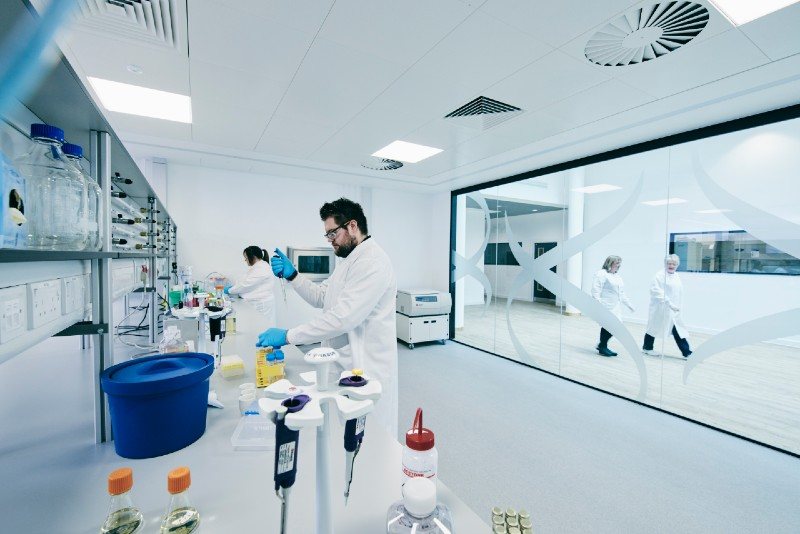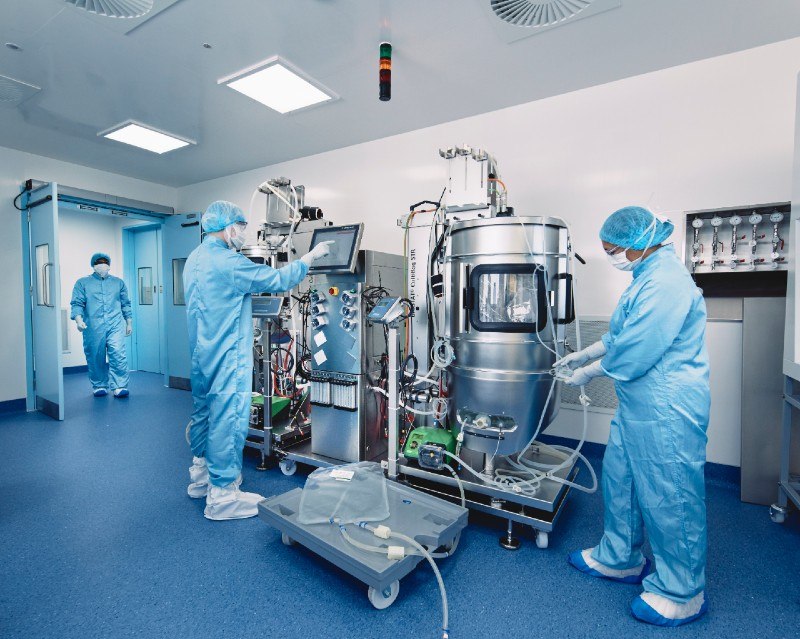
Q&A with James Miskin, Oxford Biomedica
Our first London Advanced Therapies ATN event of the year took place last month, where we did a deep dive into Advanced Therapy Medicinal Products manufacturing. With 25 manufacturing facilities across the UK, we are competitively positioned as a leading global hub in the field, but key challenges remain to be addressed, particularly when it comes to manufacturing at scale. We spoke with James Miskin, Chief Technical Officer at Oxford Biomedica, a leader in lentiviral vector research, development and bioprocessing, to find out his thoughts on the landscape, challenges, and how to overcome these.
You’ve been with Oxford Biomedica since 2000 – in the last few years activity in the sector has really ramped up as it prepares to commercialise and scale up manufacture. How has Oxford BioMedica evolved during this time?
The landscape has changed drastically over the last few years, with big pharma now taking a real interest in gene and cell therapies. Before this, it was difficult for the finance houses to believe this could be a commercial success, but now we are seeing lots of new businesses popping up.
I started out as a research scientist before joining Oxford Biomedica 20 years ago. We began as a spin-out from Oxford University, with a pure focus on our own technologies and programmes. Primarily triggered by our relationship with Novartis, we have changed into a company that also works with strategic partners to offer technical expertise, capabilities, manufacturing, and analytics. It’s been a great journey and we have grown from 80-100 employees across the first 10 years, to being in excess of 550 employees by the end of 2019.
Last year, Oxford Biomedica confirmed a 5-year extension of its partnership with Novartis and you will be dedicating a manufacturing facility to them. Talk us through this journey.
Our first agreement with Novartis, who are a key strategic partner for us, was back in May 2013. But our first big deal was in October 2014, when we were announced as their vector partner with the soon-to-be Kymriah®, a living cell-based medicinal product, which effectively reprogrammes patients’ own immune system cells. Since then, we signed a supply agreement in summer 2017, which was extended by a further 5 years in December 2019, which really illustrates the mature and highly embedded relationship we have with Novartis. We provide our technical competence, expertise and innovations, that makes their products and manufacturing more effective.
We have three sites for vector manufacturing, two of which are MHRA and FDA licensed, and we are currently developing our new facility, Oxbox. This is our new multi-product facility in Oxford and will be a centre of excellence – it is much bigger and also brings in-house fill and finish. We are committed to making sure vector capacity is being met for our partners including enabling dual supply where appropriate.
This emerging industry is at a critical stage in translating research into manufactured products. What is the potential of these disruptive technologies to deliver real benefits to patients and, at the same time, to provide a new area for the UK to lead?
Firstly, I’m biased! I’ve been in the sector for 20 years and I am a firm believer that these therapies have a long-lived place in medical development. Gene and cell therapies won’t be suitable for every disease – it is always complicated and relatively expensive compared to a small molecule tablet – but it can do things that other treatment types, like biologics, can’t do.
Take Kymriah® as an example; for many years, particularly in paediatric ALL there wasn’t any significant innovation and no real options for late stage patients in relapse. Suddenly along comes a therapy that has the potential to wipe out the cancer entirely in a significant number of patients. This is what separates it from other types of treatment.
The UK excels in gene and cell therapies because of its fantastic network of academic organisations, innovation, and its supportive structure of funders such as the MRC and Innovate UK. But we need to entice and keep people here by ensuring the UK is as attractive as the opportunities abroad.
What are the immediate steps you would take to ensure the UK remains attractive?
We need to encourage the Government to think big picture around how to ensure the UK remains a competitive market. They need to ensure support is there for early-stage clinical as we excel in that in the UK and with a significant amount of activity specifically in London, and make it as easy as possible for companies and academics to initiate trials here in the UK.
Post-Brexit, we also need to maintain regulatory quality. As a consequence of Brexit, it is vital that the MHRA is retains its influence as very well-respected regulator globally. That standard of quality needs to be maintained because, for a company, if you start a trial using manufacturing that is commercially viable from day one you can get it to market quicker.
I would argue that we also need to support long-term securing of tax revenues for manufacturing and it’s not just down to the policymakers, but the academic and biotech community should be encouraged to manufacture early-stage trial material in the UK.


What are some of the unique challenges of manufacturing advanced therapy medicine products compared to other more traditional therapies?
At a basic level, using gene and cell therapies, you can come up with a treatment that does something clever to a cell or a tissue. Typically, you can be very targeted, so if you’re making a therapeutic protein and it’s getting to the right part of the cell or tissue, it will show the effect you are looking for.
Unfortunately, these types of vector are expensive and hard to make in large quantities but are easy to inactivate and destroy in processing and purification. One of our key focuses is on making more vector at higher quality and making it more accessible, so we can tackle these issues.
If you look at cell therapies, the complications are even greater because you’re looking at the biological function in the cell itself. Over time you can reduce risk and increase simplicity, to make it more straightforward to safely and quickly develop these products. But this requires a regulatory process that is flexible and allows you to make changes when needed.
Of course, you want to start a product to evaluate if it works from a clinical perspective, but ultimately the product needs to be efficacious and safe. During this period, it is important to continue investing in how the product will be manufactured long term.
Do you think there will be any challenges to the landscape with the UK leaving the EU?
The fact is that we just don’t know where we stand in our relationship with Europe. There is no common or mutual recognition agreement in place. I would urge policy makers to keep this at the top of their thoughts when thinking about our long-term relationship with Europe.
If that’s made possible, there would be no reason why people wouldn’t want to continue manufacturing and developing products out of the UK for the global markets, including Europe.
How is Oxford Biomedica dealing with the challenges faced by COVID-19?
We have implemented a daily senior management working group to monitor current COVID-19 developments and GOV.UK guidance, to risk assess our supply chain and to direct the company’s phased response. We regularly communicate with staff on the ongoing situation and have implemented steps to contain any spread, such as publicising good personal hygiene practices, enforcing a travel management prevention strategy, and allowing people to work from home.
We continue to work with staff, customers and suppliers to monitor any potential disruption and, so far, we have not experienced any and at present do not expect to experience any significant supply issues or changes in customer demand.
What excites you most about your immediate future work in the field?
We have been pioneers in this sector for a long time and we are still pioneering in clinical development. We were the first to put lentiviral vectors directly into patients with Parkinson’s disease in 2008. That takes a different kind of investment model – high risk, high return – so we need to get the balance right for our shareholders.
We are not just focused on our own programmes now and instead work with a lot of strategic partners, such as Novartis, Sanofi, Imperial Innovations, Orchard Therapeutics and now also Juno Therapeutics following our new partnership announcement with them in March. This is one of the key changes we have made in the last decade and this is what excites us. But we’re not an organisation that works on an arms-length transactional basis, rather we are a company that provides technical expertise and solutions to solve problems and enable commercialisation.
A lot of what we do in terms of innovation is a virtuous circle in that we own the technology that goes into our partners’ products, which allows us to add innovations and improve those products, and we can then apply that to our own programmes. I would like to see that balance maintained.
Is there anything you want to see the ATN doing to support advanced therapies?
The UK benefits from the cluster around London and the greater south east and it’s really important to showcase this as part of the UK’s global offer. While we need to join up the rest of the UK, there is undeniably a lot of activity in an around London and the Government shouldn’t deter it.
I would also say, let’s also not get distracted by the ‘new and shiny’. For example, I think gene editing is potentially fantastic but don’t forget about enabling and rolling-out the ‘traditional’ gene and cell therapy treatments that are here today and would benefit from continued investment to maximise value creation in the long term. Innovation doesn’t pay for itself and it is not easy to get funding in the UK because the level of appetite for risk is not the same as the US, for example. Academically we are brilliant in the UK, but it would be great to see grant funders and policy makers encourage the long-term embedding of medical manufacturing. Anything the ATN can do to support and showcase this and encourage policy change, would be great.